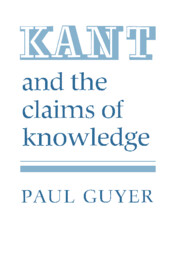Book contents
- Frontmatter
- Contents
- Acknowledgments
- Note on sources
- Introduction
- Part I Kant's early view
- Part II The transcendental deduction from 1781 to 1787
- Part III The principles of empirical knowledge
- Part IV The refutation of idealism
- 12 The problem, project, and premise of the refutation
- 13 The central arguments of the refutation
- 14 The metaphysics of the refutation
- Part V Transcendental idealism
- Afterword
- Notes
- Index of passages cited
- General index
12 - The problem, project, and premise of the refutation
Published online by Cambridge University Press: 09 March 2010
- Frontmatter
- Contents
- Acknowledgments
- Note on sources
- Introduction
- Part I Kant's early view
- Part II The transcendental deduction from 1781 to 1787
- Part III The principles of empirical knowledge
- Part IV The refutation of idealism
- 12 The problem, project, and premise of the refutation
- 13 The central arguments of the refutation
- 14 The metaphysics of the refutation
- Part V Transcendental idealism
- Afterword
- Notes
- Index of passages cited
- General index
Summary
In the preceding part, we examined Kant's arguments that objective states of affairs could be assigned determinate relations of succession and coexistence in time, and ultimately even determinate relations of position in space, only if interpreted as altering or coexisting states of enduring substances thoroughly subject to laws fully determining their successive and simultaneous occurrence. Of course, the a priori validity of such principles of objective time-determination presupposes that we are entitled to make empirical judgments about the properties and relations of objects distinct from our own representations of them, in spite of the obvious fact that our access to such objects is always through these representations. Thus the demonstration of the objective validity of the a priori concepts by means of their role in empirical time-determination cannot accomplish Kant's original objective of proving against both empiricist and skeptic that the understanding can “onstruct for itself entirely a priori concepts of things, with which the things are necessarily in agreement” (letter to Marcus Herz, 21 February 1772, 10:130–1) without a justification of the practice of objective time-determination itself. Further, we have now seen that there is an even more intimate connection between the objective and subjective stages of Kant's theory of time-determination. Kant's central argument for the principle of causation can be saved from the traditional objection of fallacy only by the recognition that determinate knowledge of even the merely subjective succession of experiences is not the product of passive acquaintance with successively apprehended representations but itself depends on empirical judgment connecting these representations to the realm of enduring and rule-governed objects.
- Type
- Chapter
- Information
- Kant and the Claims of Knowledge , pp. 279 - 296Publisher: Cambridge University PressPrint publication year: 1987
- 1
- Cited by



